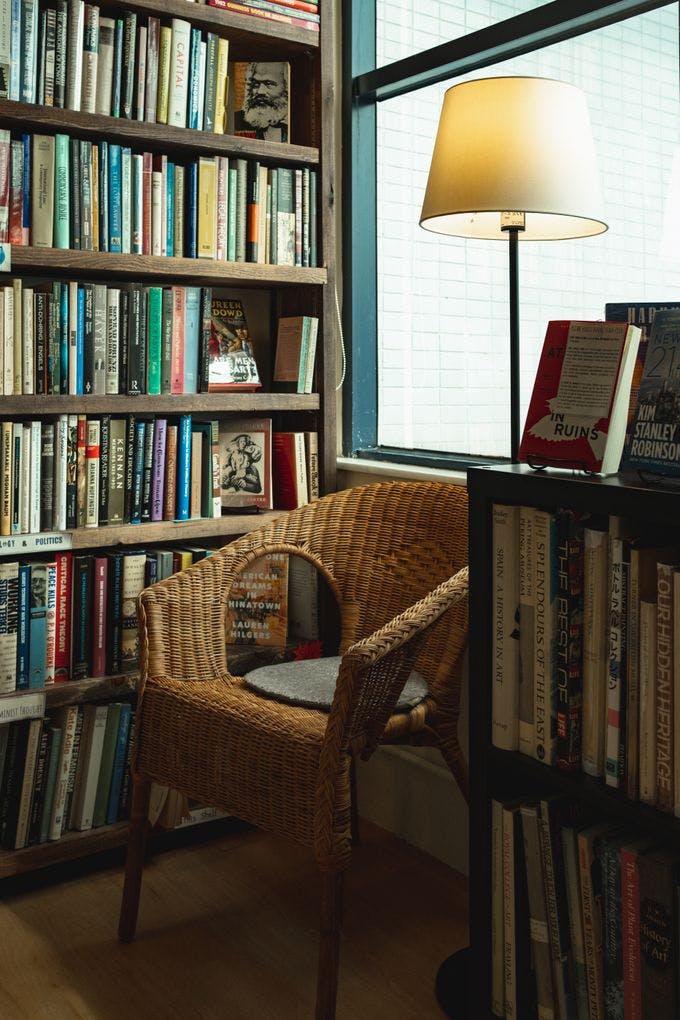How Many Books Should We Have in Our Home for Our Kids?


Any time customers cancel their Bookroo subscription, we ask why. We want to know how we can improve our service, and feedback from users provides the most valuable insights. One of the most common responses we get is that subscribers feel they have too many books at the moment.
Too many books. At first glance, it seems like a valid reason. I can certainly appreciate feeling a little tight on space–I mean, we lived in a studio apartment in New York City with not one but two children, for Pete’s sake. So ya, I understand feeling like there’s not enough room for more books.
Yet at the same time, I think too many of us think we have too many books, or “enough” books, too quickly. Author H.P. Lovecraft once said, “I couldn’t live a week without a private library – indeed, I’d part with all my furniture and squat and sleep on the floor before I’d let go of the 1,500 or so books I possess.” Imagine reaching a library of over 1,000 books before we decided we had “enough” books.

Why It's Important to Have Books in Our Homes
Before we look at how many books we should have in our home for our kids, let's quickly refresh why it's important to have books in our homes.
According to a study published in the social science journal Social Forces, the mere presence of books in a home correlates to better academic performance among the children in the home. As the study reported, the researchers found that "the number of books in the family home . . . exerts a strong influence on academic performance." This improved academic performance was demonstrated in diverse households around the world. As the study found, the positive impacts from books in the home were found "regardless of the nation's ideology, political history, or level of development."
We've shared before the experience of Dr. Ben Carson, related in his autobiography Gifted Hands: The Ben Carson Story. His single mother, Sonya, was working two to three jobs to provide for Ben and his brother, who both struggled in school. One of her jobs was cleaning homes, and as she cleaned, she had an epiphany: the homes she was cleaning—homes owned by people who could hire someone to clean their homes—all had libraries. Her realization of the importance of books changed the course of Ben's life, who went from a struggling student to a graduate from Yale University and chief of pediatric neurosurgery and a world-renowned surgeon at John Hopkins by age 33.
Certainly, having books in the home is beneficial for our children's development.
How Many Books Should We Have in Our Home?
Now that we know it's important to have books in the home, we can return to the question of how many books we should have in our home for our kids.
As it turns out, the number of books we have does matter.
The Social Forces study we mentioned not only concluded that the presence of books in a home improves academic performance. It also identified how the number of books impacts the degree of improvement.
According to the study, the largest impact on academic performance was obtained by having 100 books in the home. A 100 book home library resulted in performing 1.5 grade levels ahead in reading.
In a home with 500 books, reading levels were ahead by up to 3 grade levels. As the study found, "Gain from a 500-book home library rather than from a one-book library is equivalent to the gain of somewhere between one . . . and three additional years."
A good friend of mine who graduated from his undergraduate program with a near perfect GPA before attending Harvard Law School estimated his parents' home library to consist of as many as 2,000 books.
How Do We Find Space for Our Books?
As far as where to find space for so many books, I love Dr. Seuss’s recommendation:
“Fill your house with stacks of books, in all the crannies and all the nooks.”

Beloved children’s author Roald Dahl also suggested filling a house full of books. In Charlie and the Chocolate Factory, his unique Oompa-Loompas described such a home:
The nursery shelves held books galore!
Books cluttered up the nursery floor!
And in the bedroom, by the bed,
More books were waiting to be read!
The Oompa-Loompas also had a suggestion of where to find more room for books when space was running low:
So please, oh please, we beg, we pray,
Go throw your TV set away,
And in its place you can install
A lovely bookshelf on the wall.
I wonder how our book collections compare to our DVD collections? Or perhaps more poignantly, how does the number of books we make available to our children compare to the number of shows we make available to them via Amazon Prime, Netflix, or Youtube? Or how does the amount of money we spend on digital entertainment compare to what we invest regularly in books?
I’m not pointing fingers here; these are questions we ponder here in our own home as well.
I can tell you by personal experience that there is something wonderful, almost magical, about having plenty of books around the home for your child to discover. Let me share a recent experience we had in our own family. As many of you know, two of our Bookroo Crew members, Jane and Kesler, are based in Palo Alto, California. Last month, we took a family vacation to visit Jane and Kesler and tour Stanford, San Francisco, and other local attractions. Because our team of children’s book reviewers is based in Palo Alto, our main collection of children’s books is stored there as well. During our trip, our two boys LOVED exploring the collection of books. In the morning, at night, between activities, before naptime, before bedtime–they were always pulling new books from the shelves. Yes, kids often enjoy re-reading their favorite books, but they sure love to have fresh reading material as well.
Nothing Else So Beautifully Furnishes a House
Building an extensive home library is not something many of us have the budget to do overnight, though shopping book deals or buying discounted books from library discards or yard sales can help you get a jumpstart. Rather, it's a process over time of regularly acquiring books, like with our children’s book clubs, which are a great option for routinely adding quality books to your shelves.
Before you decide you have enough books, consider whether there aren’t some “crannies and nooks” where you can fit a few more. As Henry Ward Beecher observed, “Books are not made for furniture, but there is nothing else that so beautifully furnishes a house.”